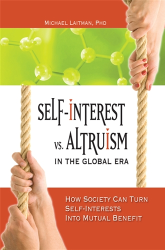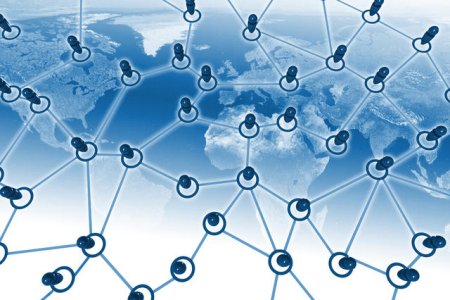The wisdom of Kabbalah views reality as a single entity, with humans representing the highest level of existence, in the sense that we possess the most intense and most narcissistic desire to receive. It is now time to outline what humanity can do to shift the negative trend, considering that we are irreversibly interdependent and interconnected as we can clearly observe through the daily events of the deepening global crisis. And while it is beyond the scope of this article to outline a detailed “bailout” plan for humanity’s present and future crises, it is worthwhile to point out some solutions that we believe could be implemented on a broad scale, and if done right, resolve most of our problems.
How Collectivism and Globality Relate to Becoming Like the Creator
Although humanity has little experience operating as a global system, since we are used to defining ourselves as individuals or members of factions of society, from family to nation-state, the current situation necessitates that we expand our view. Most of the political and financial leaders in the world already acknowledge this requirement.
Kofi Annan, former Secretary General of the United Nations, for example, addressed this issue in a message to the first Annual Interdependence day on September 12, 2004: “A new era is upon us. In the future…the world will be transformed…by the forces of globalization and the growing interdependence of the world’s peoples. …the more interdependent we become, the more decisions have to be taken not by one nation state alone, but by many, acting together. Unless it is properly managed, this process can entail a ‘democratic deficit,’ as decision makers are further removed from and less accountable to the people whose lives are affected. So the challenge for all of us is to manage our interdependence in ways that bring people in, rather than shutting them out. Citizens need to think and act globally, so as to influence global decisions” (The Interdependence Handbook: Looking Back, Living the Present, Choosing the Future, edited by Sondra Myers and Benjamin R. Barber).
More recently, in September, 2008, former British Prime Minister Gordon Brown addressed the issue of globalization and global responsibility in several statements. “Each generation believes it is living through changes their parents could never have imagined—but the collapse of banks, the credit crunch, the trebling of oil prices, the speed of technology, and the rise of Asia—nobody now can be in any doubt that we are in a different world and it’s now a global age.”
Later, Brown reflected on the background of globalization: “And we know that the challenges we face in this new global age didn’t begin in the last week, or in the last months, but in fact reflect deeper changes in our world.”
Brown is right in saying that a deeper change is underway. When Stage four sets in, it induces collectivism and globality (note that globality is a condition in which the process of globalization is complete, unlike globalism, which compares with imperialism and nationalism). The last stage in human development—becoming like the Creator—cannot be achieved alone. It entails uniting all fragments of Adam’s soul, and through that union constructing the quality of bestowal, which is the Creator. All of us are parts of the desire that was created in Stage four, the desire intended to achieve the purpose of creation—being Creator-like. Hence, we must reconstruct that broken desire, broken soul, together. And to do that, we must reunite in the sense that we become fully aware of our oneness and begin to experience the truth of our interconnectedness in a very real way, instead of our current, limited perception of it.
The Need to Collaborate to Experience Interconnectedness
To experience interconnectedness, we must act on it, and not just at the global or national level. Awareness of our interdependence should be a constant in our decision-making processes and an inseparable part of the resulting actions. We must learn how to think as a unit that consists of many collaborating individuals, rather than as disparate, separate, and randomly interacting individuals. And to do that, we must begin to recognize the benefits of collaboration.
Numerous experiments have already been made on the benefits of collaboration in the education system. In an essay called, “An Educational Psychology Success Story: Social Interdependence Theory and Cooperative Learning,” University of Minnesota professors, David W. Johnson and Roger T. Johnson present a compelling case for the “social interdependence” theory. In their words, “More than 1,200 research studies have been conducted in the past 11 decades on cooperative, competitive, and individualistic efforts. findings from these studies have validated, modified, refined, and extended the theory.”
Johnson and Johnson explain that “Social interdependence exists when the outcomes of individuals are affected by their own and others’ actions.” This is contrary to dependence, in which party A depends on party B, but party B may not depend on party A. “There are two types of social interdependence,” they assert, “positive (when the actions of individuals promote the achievement of joint goals) and negative (when the actions of individuals obstruct the achievement of each other’s goals).”
If we reflect on the Christakis-Fowler experiment, and consider the long standing assertion of Kabbalists that we are all factions of a single entity, it becomes clear that today, acting individualistically is not only unwise, but is nothing short of a time bomb. Such attitudes do not recognize the reality of total globalization among all members of the human race. And when we ignore this fact, reality harshly sets us straight, as the 2008 financial crisis so clearly demonstrated.
The Secret of Creating Positive Interdependence
After establishing the meaning of interdependence, Johnson and Johnson went on to compare the effectiveness of cooperative learning to the commonly used individual, competitive learning. The results were unequivocal. In terms of individual accountability and personal responsibility, they concluded, “The positive interdependence that binds group members together is posited to result in feelings of responsibility for (a) completing one’s share of the work and (b) facilitating the work of other group members. Furthermore, when a person’s performance affects the outcomes of collaborators, the person feels responsible for the collaborators’ welfare as well as for his or her own. Failing oneself is bad, but failing others as well as oneself is worse.” In other words, positive interdependence turns individualistic people into caring and collaborating ones, the complete opposite of the current trend of growing individualism to the point of narcissism.
Johnson and Johnson define positive interdependence as “A positive correlation among individuals’ goal attainments; individuals perceive that they can attain their goals if and only if the other individuals with whom they are cooperatively linked attain their goals.” They define negative interdependence as “A negative correlation among individuals’ goal achievements; individuals perceive that they can obtain their goals if and only if the other individuals with whom they are competitively linked fail to obtain their goals.” Globalization entails positive interdependence. In other words, either we all attain our goals, or none of us will.
You Don’t Have to Be the Creator to Become Like the Creator
The wisdom of Kabbalah states that by performing acts of altruism we imitate the Creator—the life-giving force that creates and propels everything that happens. We also said that just as children become grownups by imitating grownups, we will become Creator-like by imitating the Creator. Without realizing it, by collaborating, these students were imitating the law of bestowal, where self-interest yielded before the interest of their environments, which were their groups. And instead of achieving in line with the group’s average capabilities, the students became straight A+ students.
Yet, what they achieved pales in comparison with the benefits that these students could achieve if they acted as they did in order to imitate the law of bestowal. In that case, they would discover that law and would achieve the purpose of Creation. Namely, they would become Creator-like.
Children imitate a role model that they want to become, be it a pop star, a successful athlete, or any person that they admire. Similarly, we must know that we want to be like the Creator in order to become that. It cannot happen “by mistake.” As beneficial and collaborative as the behavior of the children was in the experiment, to have a lasting effect they must do it with the goal of discovering the law of yielding self- interest before the system, and aspire to live it, to become it. Otherwise, their egos will take over as all the other people are overcome by their egos, and they will lose the great benefits that social interdependence offers.
 “Are You Benefiting from Your Interdependence With Others?” is based on the book, Self Interest vs. Altruism in the Global Era: How Society Can Turn Self Interests into Mutual Benefit by Dr. Michael Laitman.
“Are You Benefiting from Your Interdependence With Others?” is based on the book, Self Interest vs. Altruism in the Global Era: How Society Can Turn Self Interests into Mutual Benefit by Dr. Michael Laitman.

